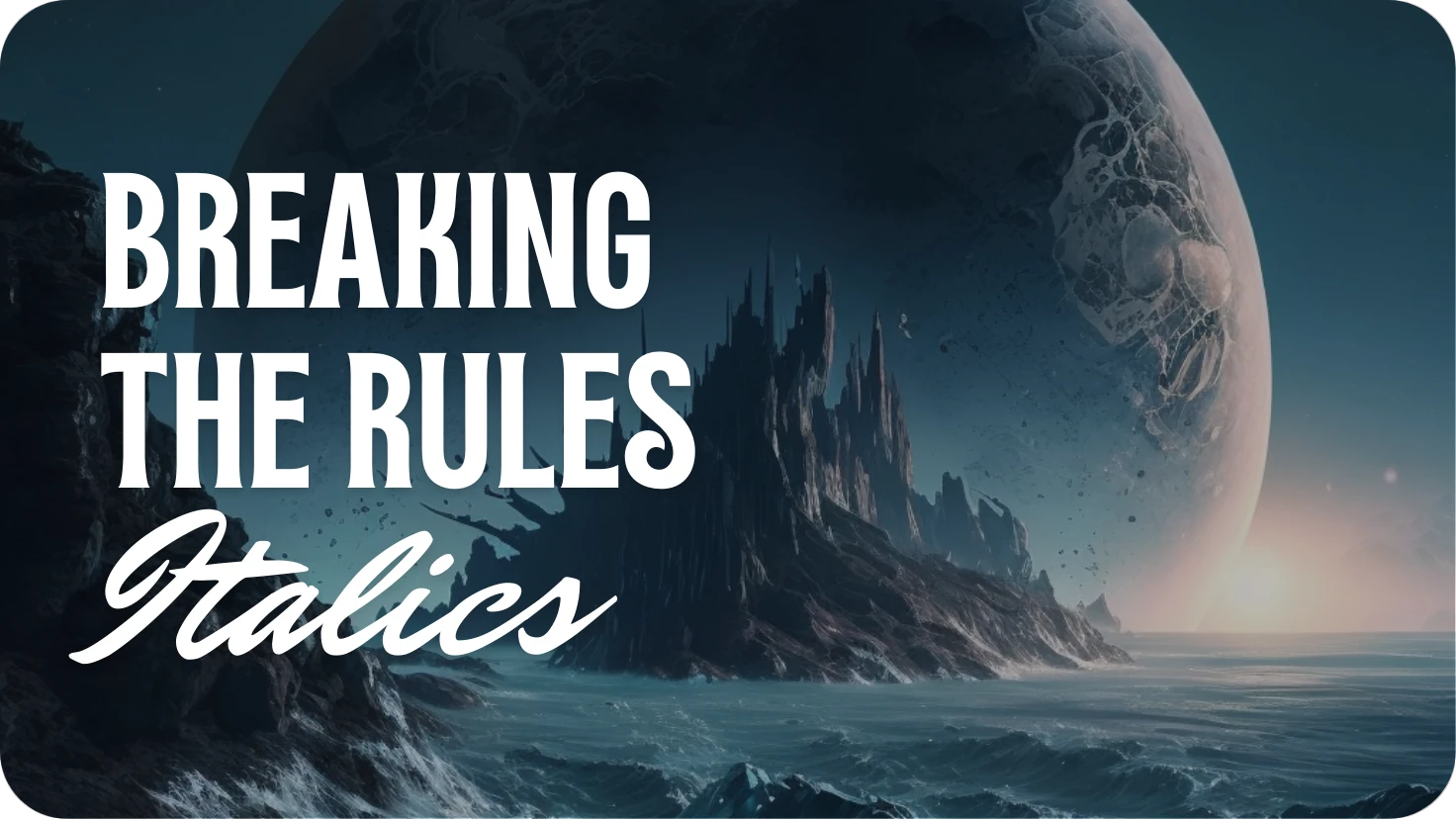As any writer knows there are a plethora of rules surrounding writing and even more when it comes to publishing, but it can cause unnecessary limits when writing Fiction, Poetry, Sci-Fi, and Fantasy. Today, I would like to take you through those rules and when to break them. Let’s start with Italics.
Italics are used for emphasis or contrast. It is a cursive font based on a stylized form of calligraphic handwriting in which the letters lean to the right. It’s typically used for titles, citations, and only rarely used in writing, according to the rules. I like to take liberty with the word rarely. Even publishers recommend using it sparingly in works, but I’ve found it is a perfect avenue for reader-only information and internal dialogue; as well as emphasis or change in tone.
My style of writing is heavy in the internal monologue section. It moves the story along and helps piece together foreshadowing that the reader may or may not have noticed. Here is an example from God of Gears Season 1 Episode 1:
This was a planned robbery. Someone leaked something. I was unaware I was going to work on this watch until it came in this afternoon. The duchess even came hooded to avoid attracting attention.
From the italics we can see this is an internal thought that no one, except the character and reader, is privy to. It also brings attention to an earlier event that adds context to the events of the current scene. You can expand upon this avenue for information by giving reader-only info. Here’s an example from Full Moon King Season 1 Episode 14:
Anubis (Anpu) Khepri Khnum: God of embalming and the dead; God of creation, the movement of the sun (when he helps Amun-Ra), and rebirth; God of the source of the Nile (deferred duties to Styx and the other port Gods).
This section of italics is subtext for the character who is based off a few Gods mixed together. While you can try to have dialogue or some kind of scene to explain this, it could harm the flow of the story. In this instance, reader-only section assists with general information needed for the story. Afterall, not everyone is familiar with Kemetism (Religion of Ancient Egypt). This kind of information can be reused/revamped should it change or be revisited in a sequel/prequel.
Italics are still more versatile than just what’s shown above. They can be used to denote someone’s handwriting if fonts are not available on the platform you are writing on. This would need some assistance from context clues like how a letter is set up or a character mentioning they are taking notes. Here’s a modified example of a written note from Full Moon King Season 1 Episode 108:
Machine mind… Has human genes or was raised to believe he was human.
In the above example there is a different font for the real release, but I’ve changed it to show how it would look in italics instead. In a similar vein, you could use it for sung words. While dialogue tags will help with that it is an added flare you can do if they switch from talking to singing mid-sentence. Here’s an example from Full Moon King Season 1 Episode 61:
Dawn joined her father in song. A perfect harmony of a father and daughter… A God and his Godly Servant…
“Its light will guide you. Its light, a shield from harm. Its light will guide you. My child of the moon. The moon, your kingdom. The moon, your safe haven. The moon, your kingdom.”
The italic words give a flowing sensation to match the unheard music. To push this further it can be used to draw attention to onomatopoeia words like Bang or Crash. Example from God of Gears Season 1 Episode 1:
“You don’t have to do this—”
Bang!
As you can see, it leaves a direct impression of a gun and wanting to know more. Of course, we can’t forget its original function; to draw attention or emphasis. When a character is speaking you may want to have them emphasize a certain word for meaning or change in tone. Here’s an example from Full Moon King Season 1 Episode 111:
“I mean first you try to sell us you’re some ‘God of Death’ and give a ridiculous last name that means death in another language and then make us pity Dawn and her sob story for clout,” Hideaki listed off arrogantly.
In this case, the character emphasized a title that he has little belief in. It draws greater attention than the rest of the sentence and can hint how the other character may react in response to the harsh or sarcastic words said in arrogance.
As you can see bending or breaking the rules of Italics can offer an additional layer to the story; allowing emotions to shine through or offer readers a different perspective of the event. I hope you’ll use this newfound freedom from rules and enrich your writing.
About the Author: Raven Diamond is the author of God of Gears and Full Moon King exclusively on Mythrill. She is also an award nominated Singer/Songwriter (NAMA 2019 Controlled) and has several comic series on top of published shorts, poems, and novels. She can write in almost any genre and loves redefining the lines of Good and Evil in her stories alongside showing the world from unique perspectives. She loves learning new skills and trying new things. When this jack of all trades isn’t tinkering on inventions or assisting her brother with their company, she likes reading, gaming, and spending time with her family. www.ravendiamond.com
a

